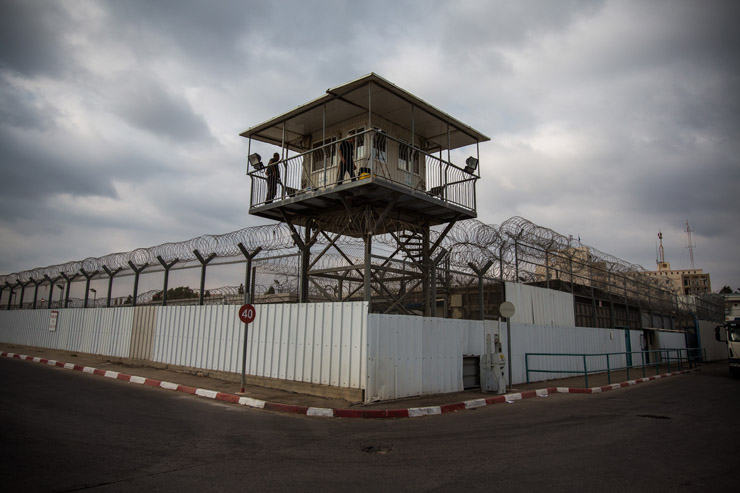Out of 402 people Israel was holding in administrative detention at the start of November, at least 31 were citizens or residents of Israel. Over the past decade, Israel has held 3,761 people without trial.
By Noam Rotem

Israel held at least 31 of its own residents and citizens in administrative detention during the month of November, according to a Knesset Research and Information Center report obtained by +972’s Hebrew-language sister site Local Call. That is a very large number when compared to the number of Israelis who have been held in administrative detention in recent years.
According to the report, which was composed at the request of MK Basel Ghattas (Balad/Joint List), four of the administrative detainees are Jews, six are Palestinian citizens of Israel, and 21 are Palestinian permanent residents of Jerusalem. When you include Palestinians from the West Bank, Israel was holding a total of 402 administrative detainees as of the start of November.
Other reports indicate that the number of administrative detainees has increased even more in December.
Administrative detention is an extreme measure for revoking someone’s freedom without putting them on trial or even presenting any evidence or accusations he or she can contest. It is supposed to be used only in extraordinary circumstances.
The legal authority for putting Israeli citizens administrative detention is drawn from the 1979 “Emergency Regulations” law, which is valid as long as the country remains in a “state of emergency.” Israel has been in a declared “state of emergency” since May 15, 1948, the same day it declared independence.
For non-Jewish, non-citizens of Israel living under Israeli military rule in the West Bank, the authority is drawn from Military Order 1651, which bestows the regional military commander with the authority to issue administrative detention orders.
In both cases, the duration of detention is limited. Authorities can issue orders for up to six months of detention without trial, but there is no limit on how many six-month orders can be issued.

According to the Knesset Research and Information Center report, of the 402 total administrative detainees, more than 75 percent (303 individuals) have been in detention without trial for more than six months. Forty percent have been detained without trial for over a year, and 2.5 percent for over two years.
None of those 402 people have been charged with a crime and none of them have had an opportunity to defend themselves in a court of law. Somebody simply decided to put them in prison, and there’s nothing they can do about it.
Israel has put 3,761 people in administrative detention over the past decade, some more than once. That is an enormous number for a country that calls itself a democracy, and which codified such powers for use only in times of emergency.
Among those thousands of administrative detainees, only 35 have been Jewish. More than 99 percent have been Palestinian, the vast majority of whom live under Israeli military rule in the occupied territories.
In roughly 5 percent of cases the state decides to file an indictment at the end of the administrative detention period. The vast majority are simply released when their detention order expires — as if nothing ever happened. After being imprisoned for months and years without ever being formally accused of any crime, they simply go home. Only one administrative detainee, out of thousands, was eventually sentenced to life in prison.
The situation is nothing short of absurd. A measure intended to be used only when all other options have been exhausted has become so popular that it is used on anybody whom the Shin Bet wants to detain. There is evidence that this method of detention has been used in order to recruit intelligence assets, which raises another problem: because everything is secret, there is no way of determining the necessity of these detentions.
The already tenuous supervision of both the military and civilian courts dips into dangerous territory when courts are presented with “classified evidence,” which cannot be shown to the suspect. Detainees have no way of defending themselves.
A report by “Hamoked — Center for the Defense of the Individual” cites Supreme Court Justice Elyakim Rubinstein saying during a hearing for a Jewish Israeli who was caught on camera shooting a Palestinian man: “It is not possible to hold a fair proceeding when there is material that the defense does not have the opportunity to try to use for its needs.”
Yitzhak Bam, an attorney for some of the current Jewish administrative detainees, was even more descriptive: “Have you ever tried catching a black cat in a pitch-black room when you’re not even sure there’s a cat in the room? That’s what it’s like to challenge an administrative detention order.”
Israel has increased its use of detention without trial in recent months, and for the first time in years it is using it on this side of the Green Line. The ability of the security services to “bypass” the justice system is one of the most dangerous anti-democratic procedures there is. The justice system exists in order to defend the rights of suspects and detainees, and being deprived of that defense comprises a serious blow to one’s human rights, and it represents a fatal blow to the democratic system of government. Israel must immediately stop using administrative detention orders, and either release or put on trial all those it is holding.
Noam Rotem is an Israeli activist, high-tech executive and author of the blog o139.org, subtitled “Godwin doesn’t live here any more.” This article was first published in Hebrew on Local Call, where he is also a blogger. Read it here.
